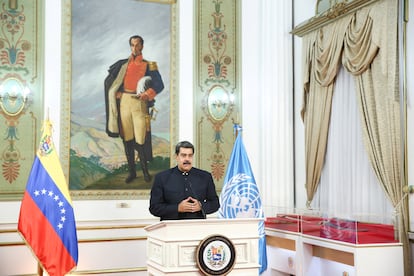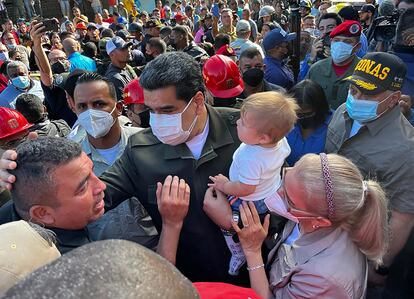Maduro regains relevance on the international stage
The renaissance of the Latin American left and talks with Washington, as well as the global energy crisis, have allowed the Venezuelan government to reposition itself

The return of leftist elected governments in Latin America and, in particular, the rise to power of Gustavo Petro in Colombia has given Venezuelan leader Nicolás Maduro some much-needed international oxygen and a certain political relevance within the region. For the first time in a long time, after years of being besieged and ignored on all fronts, Maduro’s position could be strengthened further still by Lula da Silva regaining power in Brazil.
Caracas has scored two important points to ease external pressure and reposition itself: firstly, the mediation requested by Maduro for Caracas to be the stage for talks between the Colombian government and the leadership of the National Liberation Army (ELN) – a Colombian guerrilla organization whose presence in Venezuela has been widely documented – and secondly, a prisoner exchange involving two nephews of Cilia Flores, Venezuela’s first lady, who were jailed in the US for drug-trafficking offenses, and the five American executives of the energy company Citgo, who have been under house and custodial arrest under Maduro’s government since November 2017.
The ground that Maduro has recovered has been achieved in cooperation with the political circle surrounding Venezuela, particularly with Colombia and Washington, which has embarked on a process of negotiation with Caracas independently of the Venezuelan opposition. Meanwhile, on the domestic front, Maduro is continuing on his path of applying a policy of tranquility toward the private sector, and even with the opposition currents that question his legitimacy to govern. The sensation is that Maduro feels capable of defeating his opponents definitively at the ballot box in 2024 in a scenario in which they stand divided.
The pressure being exerted by oil giant Chevron to obtain a license to extend its operations in Venezuela also seems to be crystallizing, at a time of great necessity due to the war in Ukraine. Although the Maduro government has stated that national production stands at one million barrels per day, in reality it barely reaches 700,000 and the administration is in need of a boost that, if it materializes, could increase production by an additional 300,000 barrels per day. “On the technical side, the agreements to extend Chevron’s licenses seem to be in place,” says analyst and economist Orlando Ochoa.

Maduro benefits from pandemic and Ukraine war
Meanwhile, in a scenario that would have been impossible just a few months ago, 19 nations of the Organization of American States (OAS) put forward the debate of a draft resolution to annul the position occupied in Venezuela by the interim government of Juan Guaidó, a proposal that did not prosper due to the lack of quorum, but one that nonetheless points to a softening of stances toward the Maduro administration. In 2017, the Venezuelan leader withdrew from the OAS amid an internal political crisis and in the face of a growing international scrutiny of the legitimacy of his government.
“There is a powerful oil lobby working hard to reach agreements with Maduro; not only Chevron, but also Repsol, Exxon and Statoil,” says Carmen Beatriz Fernández, a Venezuelan academic at Spain’s University of Navarra’s Faculty of Communication. “The world in 2022 is different from that of 2019. Maduro benefitted from the pandemic and now he is doing so from the war in Ukraine. The political currents have shifted. There is a growing conviction that a policy of maximum pressure on Maduro is not going to work. There has been a change of strategy,” says Fernández, who adds that from here on it is very likely that persuasive formulas will be put into play, with partial progresses that will consolidate commitments in the medium term and center around clean and verifiable elections in Venezuela.
Before the decision was made to carry out a prisoner swap with the United States, in Venezuela there had already been strong rumors of a possible resumption of political dialog between Caracas and the opposition in Mexico. These suggested that some pre-agreements were already in place in the sphere of the public health crisis, and that Maduro’s approval was all that was needed to resume talks that had been in a cataleptic state since they were announced a year ago. Chavism has little appetite to reinstate a political forum that tends to strengthen the rhetoric of its enemies, while opposition spokesmen have remained hermetic.
Emilio Figueredo, a diplomat, professor of international law and editor of Venezuelan digital news portal Analítica, attributes this repositioning to the current context: “I don’t think there is resignation to the presence of Maduro in power. There is something circumstantial in this issue. The short and medium-term effects have to be measured. The emerging left in the region is avoiding a close encounter with Maduro, I am talking about Petro and Gabriel Boric. What they want is to resolve the Venezuelan issue. Meanwhile, US Secretary of State Antony Blinken is visiting Lima and Santiago. Furthermore, the situation of Maduro’s allies, such as Cuba and Russia, is far from stable.”
Although some points on its horizon appear to have been clarified, at least three pronouncements from the UN fact-finding mission set up in 2019 to examine the issue of human rights in Venezuela are hanging over the Maduro government. These will document the social crisis in the country, ongoing economic chaos, huge failings in public services and the torture and repression that have been meted out by Chavism as a permanent practice.
Tu suscripción se está usando en otro dispositivo
¿Quieres añadir otro usuario a tu suscripción?
Si continúas leyendo en este dispositivo, no se podrá leer en el otro.
FlechaTu suscripción se está usando en otro dispositivo y solo puedes acceder a EL PAÍS desde un dispositivo a la vez.
Si quieres compartir tu cuenta, cambia tu suscripción a la modalidad Premium, así podrás añadir otro usuario. Cada uno accederá con su propia cuenta de email, lo que os permitirá personalizar vuestra experiencia en EL PAÍS.
¿Tienes una suscripción de empresa? Accede aquí para contratar más cuentas.
En el caso de no saber quién está usando tu cuenta, te recomendamos cambiar tu contraseña aquí.
Si decides continuar compartiendo tu cuenta, este mensaje se mostrará en tu dispositivo y en el de la otra persona que está usando tu cuenta de forma indefinida, afectando a tu experiencia de lectura. Puedes consultar aquí los términos y condiciones de la suscripción digital.








































